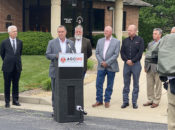Jefferson City, Mo. — In response to a drought that is heavily impacting Southern Missouri, Gov. Mike Parson signed an executive order declaring a “drought alert” that will accelerate the state’s response to drought impacts.
Parson signed the order Wednesday afternoon at a press conference flanked by Chris Chinn, Dru Buntin and Sara Parker Pauley; the directors of the Missouri departments of Agriculture, Natural Resources and Conservation respectively.
The executive order will call together the three departments to form the Drought Assessment Committee and decide the best course of action for drought relief.
Parson urged proactivity as the Southern part of the state faces severe drought. According to the federal state drought tracker, around 50% of Missouri is experiencing a moderate drought with over half of that 50% experiencing a severe drought. The drought spreads from Oregon to Boone Counties, covering a vast swath of the state.
“As a farmer myself, I know the heartache a drought can bring, especially in the middle of July,” Parson said at the press conference. “We’ve learned from past experience, the more proactive we are, the better we can help our farmers and citizens lessen the impact of even the most severe droughts.”
The departments of Natural Resouces and Conservation will work together to provide water to farmers supplied from state parks and conservation areas.
Missouri farmers have faced an uphill battle all year, facing high fertilizer and fuel costs. A drought of this scale enveloping the southern portion of the state could have dire economic impacts for many farmers.
The drought is impacting the cattle indrustry particularly hard, forcing cattlemen to decide between culling their cows now and selling into a saturated market or hope for enough rain to produce sufficient hay for cattle feeding.
“Livestock producers are having to make difficult decisions about selling livestock because there is no pasture in many areas. Grain farmers are watching their crops wither before pollination. Conditions are difficult for many Missouri farmers and ranchers,” Chinn said.
Parson suspended administrative rules and offered some avenues to financial relief for Missouri farmers. No specific spending or program for drought relief was announced besides the formation of the Drought Assessment Committee and a special session of the Soil and Water Conservation Commission on July 25.
Parson and the three directors stressed the importance of community assistance to administration during times of drought, helping the state monitor the drought and provide assistance accuractely and efficiently.
“Our partners are doing a great job helping us assess drought conditions across Missouri,” Buntin said. “We’re also relying on help from our citizens in reporting and submitting photographs of the conditions they’re seeing locally.”
Citizens can report drought conditions to the Condition Monitoring Observer Reports system.
The Parson administration doesn’t see drought conditions improving soon. Regardless of when the rains come, Parson stressed the importance of continued support to farmers through the coming months.
“This will not go away with the first rains that come,” Parson said. “This will affect these farmers in the fall, it will affect them in the winter becuase of the conditions … anytime you’re feeding livestock in July in a great amount, you know that’s problematic.”
The administration doesn’t see as much of a threat to drinking water as there was in the 2018 drought that rocked most of Northern Missouri. Southern Missouri’s access to natural water sources is expected to curb the danger of that possibillity. Parson did encourage “common sense” when it came to citizen water conservation, especially in Southern and Mid-Missouri, the hardest hit areas.
The Governor has reached out to U.S. Sen. Roy Blunt to see what federal resources may be available to the state.
“The persistent drought conditions we’re seeing in many parts of the state are a huge concern for farm families. We need to be sure farmers and producers are able to recover quickly, especially given the global food challenges we’re facing,” Blunt said in an email exchange with the Missouri Times. “I will continue to be in touch with Governor Parson, Directors Chinn and Pauley, and other state and local officials to help support response efforts.”
Featured Image Courtesy of the National Drought Mitigation Center

I’m a journalist hailing from the Detroit area. I love to tell investigative stories with a focus on everyday people.
You can contact me by email at matthew@missouritimes.com





























